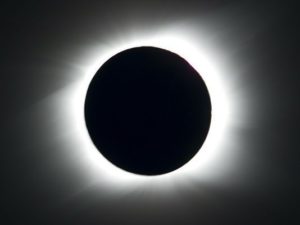 I suspect the beginning of all wisdom, of all religion, of all science, consisted of the earliest humans looking at the sky with wonder, looking for meanings, fashioning explanations. They found what they were looking for. They found gods, they found portents of good fortune, harbingers of doom. They found, as the Torah and Hagaddah says, “signs and wonders.”
I suspect the beginning of all wisdom, of all religion, of all science, consisted of the earliest humans looking at the sky with wonder, looking for meanings, fashioning explanations. They found what they were looking for. They found gods, they found portents of good fortune, harbingers of doom. They found, as the Torah and Hagaddah says, “signs and wonders.”
They also found order. The most mysterious quality of the sky was that it was humans who could figure out some of its mysteries. They found patterns. They knew that the same group of constellations appeared in the same part of the sky, every year, in the exact same place of the sky. They knew that the moon completed its cycle every 28 days, the stars every 365 days, and the five visible planets with their individual cycles, but each of them was utterly predictable. It was hard not to think that these regular patterns did not have some impact on our lives. Surely the stars and planets controlled the weather, and perhaps our personal and collective destinies? But the more we learned about the planets and the stars, the less likely this seemed. We could now understand the movement of the heavenly bodies with utmost precision, down to the nanosecond. We started to explore the heavenly bodies we once gaped at in wonder. We have even walked on the moon. Something had been gained, surely though much of the mystery had been lost.
Probably no astronomical phenomena is more mysterious than a total solar eclipse. The most basic dichotomy of life, present in the very first verse of the Torah, is the division between light and dark. A total eclipse, turning the daylight into night, violates this most basic division of all. These were the thoughts going through my head, when, on Monday, I prepared to watch the solar eclipse, which would be total where I live in Clemson, South Carolina. My brother and nephew flew down from New York City to be with us. Martha and David Birnbaum, who some of you in Rochester might know (Martha was the beloved former cantor of Temple B’rith Kodesh; David is a retired physicist and astronomer) drove up 600 miles from Tampa to be with us, or really, though they are very good friends, to be with eclipse.
We gathered in the house of a friend. We were in a group of about 20. We were talking, eating and drinking, talking about the upcoming Clemson football season. (Other than the fact that we were there for an eclipse, it was a typical Clemson football tailgate, which usually meant no talk of politics. This was fine. For a few blessed hours, all thought of our insignificant president was driven from my mind.) David, in his late 70s, had never seen a total eclipse. He gave a little talk to our group about its science. Martha said that everyone here in about an hour is going to be amazed. It was a very hot South Carolina August day, about 95 degrees. About 1 PM, using our special glasses, we watched as the moon began to cover the sun. The sun became a crescent. It began to form strange shadows. Our host turned off the country music. We all went outside. It was twilight, with a strange purple light. And then, all of a sudden, without the sun slowly setting in the west, it was night, not midnight dark, but definitely a night sky. The sun vanished, not sinking in the west, but just vanished . The corona emerged around the dark circle of the moon. (A total eclipse is also the only time you can see a new moon.) The air became cooler. A few stars appeared. The evening cicadas started their metallic chirping. David was photographing the sun with special filters.
We were in totality for 2 minutes and 40 seconds. It was a long 2 minutes and forty seconds. Martha was right; we were all awestruck, unable to believe what we were experiencing. About 20,000 times I have seen day become night and night become day, and had never gone through anything like that. The first sliver of the sun broke through. There was a weird dappling effect on the ground. The eclipse was over.
Martha had been talking to me about Rosh Chodesh celebrations. She said she felt like an ancient Israelite, looking for the new moon. For me it felt even more primitive than that, as if I was a member of an ancient tribe in the Great Rift Valley some 100,000 years ago, spear in hand, wondering what was happening to the sun, and worrying whether it would ever return. I felt a kinship with every human who had ever looked into the skies with wonder. My wife Jane, said it made her feel so insignificant. Me too. I told Martha that Judaism is a nice religion, but I wanted to be a Babylonian, and just worship the sun, the moon, and the stars.